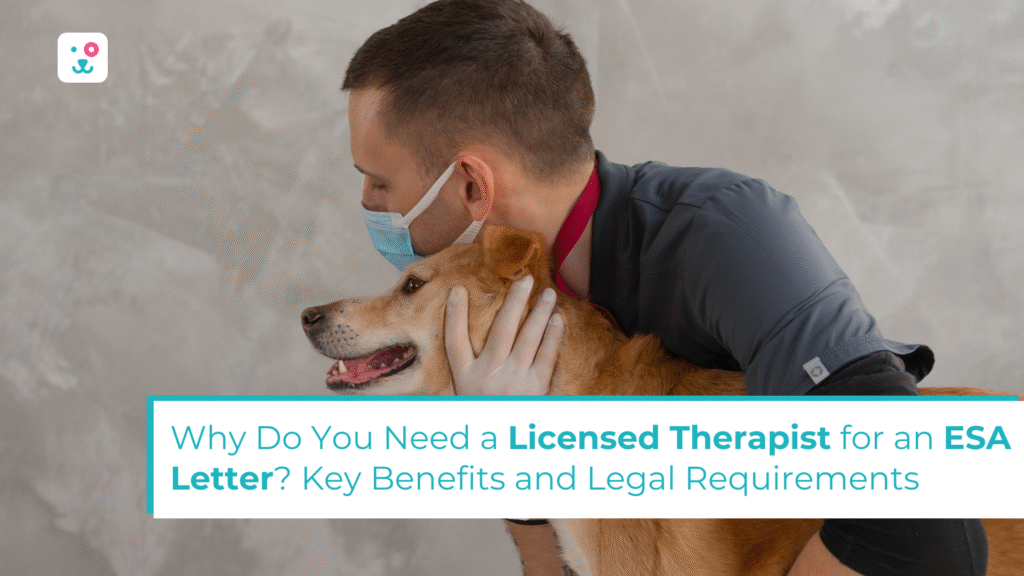Many people seek emotional support animals to help manage challenges like anxiety, depression, or stress. A licensed therapist is the only person who can write a valid letter that allows someone to have their pet recognized as an emotional support animal. This is important because it keeps the process fair and safe for everyone involved.
An official ESA letter from licensed professionals gives people the legal proof they need to show landlords or airlines. Only certain mental health professionals are qualified to provide this paperwork, as required by law. Without a legitimate letter, there is a risk of being denied housing or travel with an emotional support animal.
Getting help from a therapist adds trust and guarantees the support animal is truly needed. This process helps protect those who rely on their ESAs and keeps the purpose of emotional support animals clear.
The Role of a Licensed Therapist in ESA Letters
A licensed therapist plays a unique part in the process of getting an emotional support animal letter. They use their training to provide accurate documentation, observe legal standards, and make sure the letter meets required laws.
Legal Requirements for Emotional Support Animal Documentation
For an emotional support animal letter to be valid, it must come from a licensed mental health professional. This includes therapists, counselors, psychologists, and social workers who hold an active license in the state where they practice. The letter is only valid if these requirements are met with proper licensing information clearly included.
A therapist must write the letter on professional letterhead and include details like their license number, type of license, and contact information. The letter also needs to show a direct connection between the individual’s mental health needs and how an emotional support animal helps. Without these details, the letter could be rejected by housing providers or airlines.

Accurate Assessment of Mental Health Needs
A licensed therapist has the training and skills to assess mental health issues that may make someone eligible for an emotional support animal. They use recognized tools and methods to determine if an ESA can help reduce symptoms such as depression, anxiety, or post-traumatic stress.
Therapists meet with the individual, ask specific questions, and review mental health history before deciding if a letter is appropriate. This process is not automatic or just a matter of asking. Instead, the therapist’s professional opinion gives the ESA letter credibility and makes it less likely to be questioned or denied.
Guaranteeing Compliance With Federal and State Laws
Federal law, like the Fair Housing Act, and some state laws offer legal protections for people with emotional support animals. A licensed therapist knows these rules and can help the individual meet the correct standards. They know what information is needed and how to format the letter so it matches what law or housing officials may require.
Therapists also know what not to include to avoid privacy issues. They can explain any special steps for certain states, as some have extra rules or need added forms. By following these laws, the licensed therapist helps the letter stand up if it is reviewed by landlords or airlines.
Risks of Obtaining ESA Letters Without a Licensed Professional
Getting an ESA letter from someone who is not properly licensed brings serious problems for individuals seeking an emotional support animal. These issues range from fake documents to trouble with housing and travel.
Potential for Fraudulent Letters
When ESA letters are issued by people who are not licensed, the risk of fraud grows. Some unqualified providers sell fake ESA letters online, which may not meet legal requirements. These documents can look real but often lack information like proper diagnosis, valid signatures, or accurate provider credentials.
Fake letters can be easy to buy, but they do not prove an actual need for an emotional support animal. Some people use these false documents to avoid pet rules, but this can lead to legal action. Misuse of these letters also makes it harder for those with genuine needs, because authorities can become more suspicious of all ESA letters.
Consequences of Invalid ESA Documentation
Using an ESA letter that is not valid can have legal and personal impacts. If a landlord or travel provider discovers a letter is not issued by a licensed professional, they may deny accommodation or travel with the animal. People caught using illegal documents may face fines or eviction.
Fake or invalid ESA letters can be reported, leading to loss of housing or being banned from certain housing programs. There is also potential for damage to the person’s reputation and trust with service providers. In some cases, those using fake documents are removed from a lease or refused help in the future.
Challenges in Housing and Travel Accommodations
Housing providers and airlines often verify ESA letters to make sure they are real. Landlords may check if the letter is signed by someone who is licensed and if the diagnosis is accurate. If the letter does not pass review, the person could be denied housing or charged pet fees.
Travel can become difficult if the animal is not recognized as an emotional support animal due to faulty paperwork. Airlines may refuse boarding or not allow the animal in the cabin, which can cause stress and change travel plans. Without proper documents, both housing and travel rights may be affected, leading to disruptions in daily life.

Conclusion
Licensed therapists play a major role in providing ESA letters because they understand mental health needs. These professionals can properly evaluate if someone benefits from an emotional support animal.
Their training helps them decide if an ESA is a reasonable part of someone’s care plan. An ESA letter from a licensed therapist meets legal standards and supports the person’s needs.
Talking openly with a qualified therapist is the first step for anyone thinking about getting an ESA letter.

